
by Lorato | Jun 18, 2024 | All News, SMU Media
As you may be aware, an SMU alumna, Dr Phophi Constance Ramathuba was officially elected and sworn in as premier of the Limpopo Province, on Friday, 14 June 2024. Dr Ramathuba becomes the first woman to lead the province as Premier since the dawn of democracy in 1994.
This is a momentous occasion, not only for the Limpopo Province, but SMU as well, given that she is a proud alumna of this institution.
On behalf of the University Council, Executive and Senior Management and the whole SMU community, I would like to take this moment to congratulate Dr Ramathuba on her ascendancy to the highest office in the Limpopo province. As an alumna of SMU, we ARE proud of her achievement and overall contribution to the overall political leadership of the country.
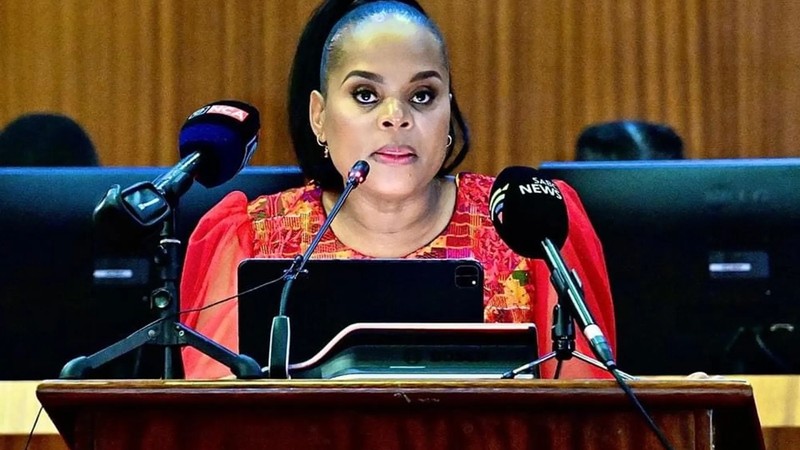
Picture source: https://www.iol.co.za/
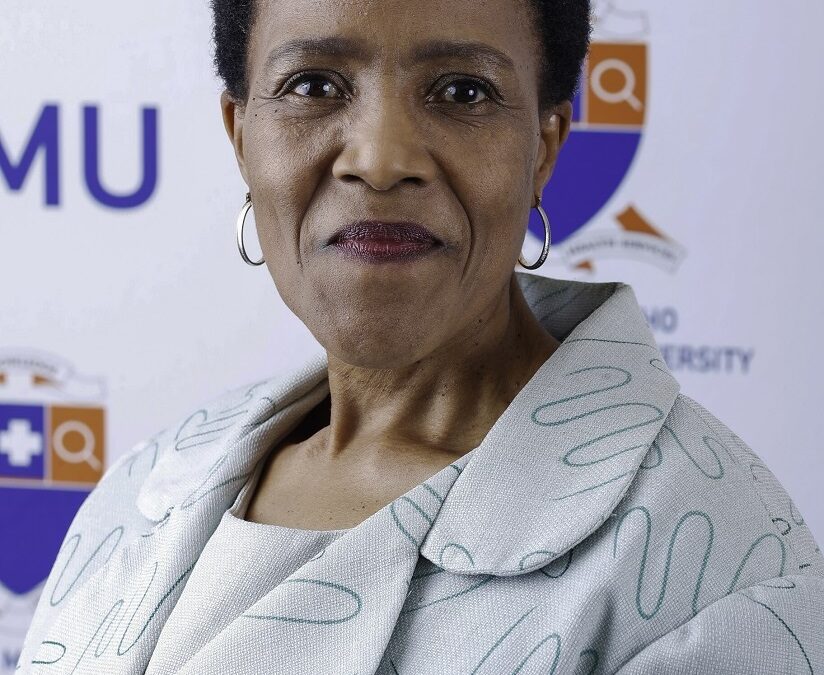
by Lorato | Jun 6, 2024 | All News, SMU Media, Student Media
At its meeting held on 9 May 2024, the Council of the University resolved to elect Ms Nontlaza Sizani to the position of Deputy Chairperson of Council. Ms Sizani, who has been a member of SMU Council since 2019, will replace Ms Mmanare Mamabolo in this role. Ms Sizani will assume her role from 23 June 2024.
In terms of her brief profile, Ms Sizani is an Accountant, who has served in this and many other capacities in various organisations for over 30 years. Ms Sizani holds Bachelor of Commerce; BCompt Honours; Certificate in Theory of Accounting (University of Transkei, now Walter Sisulu University) and a Postgraduate Diploma in Management (University of Kwa-Zulu Natal). In terms of professional membership, Ms Sizani is an Associate General Accountant (SAICA); Certified Director (IODSA); Association of Black Securities and Investment Professionals (ABSIP). Apart from her role on the SMU Council, Ms Sizani has served as a Non-Executive Director for other organisations, which has sharpened her experience in governance at an organizational level.
As we wish Ms Sizani well in this role, it is prudent to also thank Ms Mamabolo for the immense contribution she made to the work of the Council over the years, both as a member of Council and later as a Deputy Chairperson of Council.
Issued by the Office of the Registrar
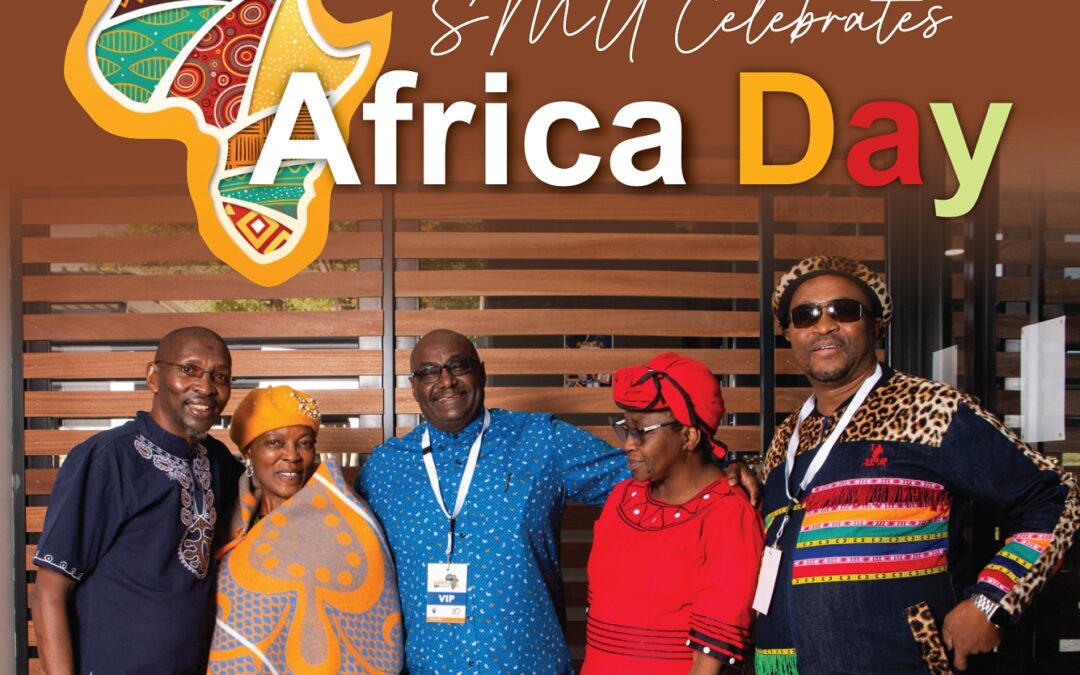
by Lorato | Jun 5, 2024 | All News, SMU Media, Student Adverts
The month of May is traditionally called Africa Month across most African countries. This month, higher education institutions and other civic entities commemorate Africa Day in one way or another. Most of the time, Africa Day is celebrated through song and dance and honouring and sharing of language, culture, and traditions.
However, the celebrations are always commemorative at heart as we remember the visionary leaders who, 61 years ago, came together with a dream of a united Africa, an Africa free from the chains of colonialism and full of hope for a brighter future. The formation of the Organization of African Unity (now known as the African Union) on May 25, 1963, marked a pivotal moment in Africa’s history when Africa’s nations stood together to forge a path towards independence, prosperity, and reconciliation.
Africa Day is thus not only a cultural celebration but also a celebration of the continent’s progress in education, economic development, and healthcare. The Africa Day theme for 2024, published by the African Union was “Educate an African Fit for the 21st Century: Building resilient education systems for increased access to inclusive, lifelong, quality, and relevant learning in Africa.” As an educational institution, this theme spoke to the heart of our beloved SMU, which celebrates its 10th Anniversary this year.
SMU thus celebrated Africa Day on the 31st of May 2024 with a joyous cultural celebration. Hosted by the Internationalisation Directorate and Advocacy and Diversity Unit of the Student Affairs Directorate, students and staff came together to commemorate and celebrate as proud Africans and an SMU family. The day commenced at the newly refurbished Amphitheatre with a rousing performance by the SMU Choir and words of support from the SMU Vice-Chancellor, Prof Peter Mbati, as well as representatives from the Interim Student Governance Structure and the President of the SMU International Student Organisation. SMU also welcomed representatives from various High Commissions and Embassies, including the Japanese Embassy, the Kenyan High Commission and the Cameroon High Commission.
After the formal part of the programme, the SMU Residence hosted cultural stalls and entertained the crowd with cultural performances.
The residences competed for 1st, 2nd and 3rd prizes and this year the following residences walked away with the titles:
- 1st Place: Residence 1 A who represented the culture of Botswana.
- 2nd Place: Residence 5 B who represented the culture of Tanzania.
- 3rd Place: Maderia Isles who represented the culture of Nigeria.
Thank you to each staff member and student who participated and assisted in making Africa Day a true celebration on campus.
Newsflash - SMU Celebrates Africa Day
File size: 2.69 MB
Created: 05-06-2024
Updated: 05-06-2024
Hits: 56
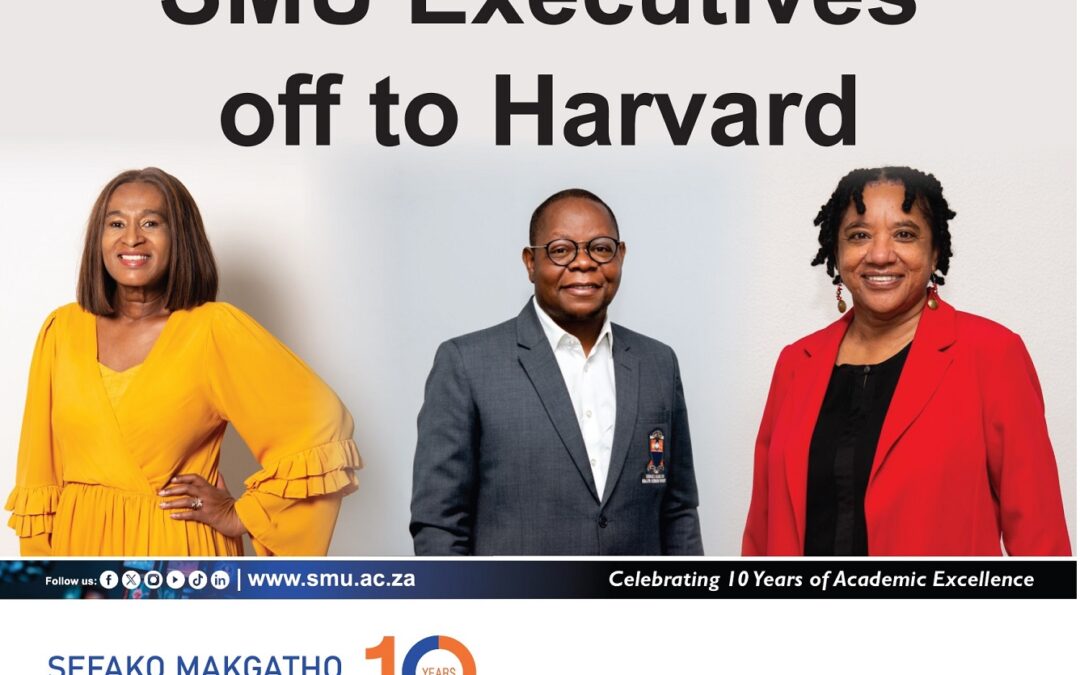
by Lorato | May 30, 2024 | All News, SMU Media, Student Media
There is no doubt that SMU operates in a volatile and competitive environment within the higher education sector. The downward spiral of funding for universities elevates the funding risk, requiring SMU and other universities to navigate through the uncertainty and ambiguity towards growth and financial sustainability. Therefore, to remain relevant, and a market leader in such a competitive market, SMU’s Management Team is compelled to come up with new and innovative ways that would place the University at a positive competitive advantage amongst its competitors. The higher education sector is evolving with tremendous speed and investment in employees who can tackle and respond to these demands is not optional.
Over the years, the University has invested in the development of its employees, including its management cohort. This has led to the concept of a Focused Leadership development approach which has been bearing fruit for the University in supporting the growth and development of the leadership cohort.
This approach commenced when more than eighty (80) leaders were trained on the Transformational Leadership Programme in partnership with the WITS Business School over the period 2019 to 2023. Through this program leaders were exposed to a set of competencies that have contributed to the shift in the University’s culture and climate. Following the success of this programme, the University took the Focused Leadership development to the next level when it introduced the Middle Management Programme in 2023, and which is also running in 2024. The intention is to have one hundred (100) Middle Managers trained in the SMU Middle Management Programme. This will bolster the quality of management at this supervisory level.
The Strategy: Building and Sustaining Competitive Advantage is a Certificate of Management Excellence (CME), and which forms part of the Executive Management Programmes of Harvard Business School. The programme will kick-start with a six-day contact session scheduled to take place from 02 June to 07 June 2024. Participants are expected to complete three selected topics for them to be awarded the Internationally Recognized Certificate.
The international programme is expected to amplify the Focused Leadership development plan and position the University in a favorable state towards the attainment of its strategic objectives. The SMU executive team will greatly benefit from a visit to Harvard University, given the new 5-year strategic plan in place, and where they are expected to acquire knowledge of novel strategies and devise preventative and innovative measures that are advantageous to the
institution. Having gained insights from global industry leaders, they are expected to return to the SMU community with more refined strategies and to impart their newly acquired knowledge. Long-term, the move is anticipated to be advantageous for both the executive members and the SMU.
All this has been made possible by a discretionary grant from ETDP-SETA. Should this programme prove successful and should the University be able to convince the ETDP-SETA to continue to fund the programme the University looks forward to sending more executives and members of the Senior Management Committee (SMC) to Harvard Business School.
The nominated delegates will travel out of the country on 29 May 2024.The University wishes Prof Matsha-Erasmus, Mr Manyawi and Ms Ramsingh well in the programme and is sure that they will make the University proud as they actively participate and excel in this programme.
VCs Desk - SMU Executives off to Harvard
File size: 1.78 MB
Created: 30-05-2024
Updated: 30-05-2024
Hits: 54
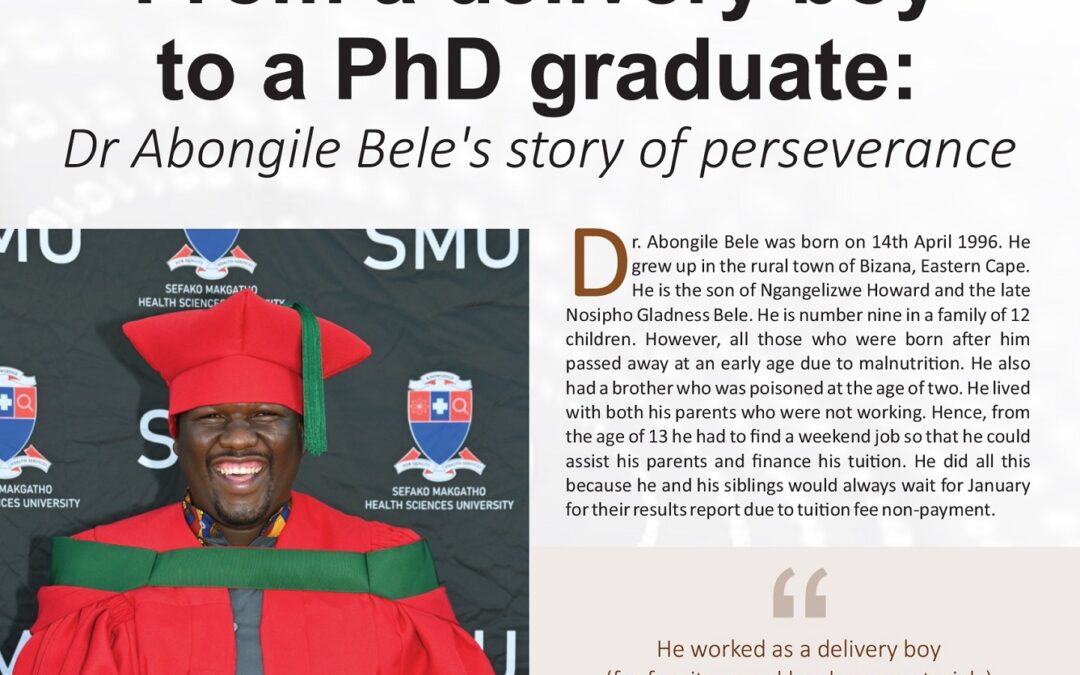
by Lorato | May 24, 2024 | All News, SMU Media, Student Media
Dr Abongile Bele was born on 14th April 1996. He grew up in the rural town of Bizana, Eastern Cape. He is the son of Ngangelizwe Howard and the late Nosipho Gladness Bele. He is number nine in a family of 12 children. However, all those who were born after him passed away at an early age due to malnutrition. He also had a brother who was poisoned at the age of two. He lived with both his parents who were not working. Hence, from the age of 13 he had to find a weekend job so that he could assist his parents and finance his tuition. He did all this because he and his siblings would always wait for January for their results report due to tuition fee non-payment. He worked as a delivery boy (for furniture and hardware materials) until his second year at the university. As he reflected on his upbringing, he stated that “I grew up in a family where we did not know where our next meal would come from. The only time we would eat rice was during the Christmas holidays when my sister would buy 10 kg of rice. Our home had two rooms, a single flat and a rondavel. We all slept in the same room. These conditions drove my commitment to education where I always believed I would get redemption”.
Dr. Bele is now married and is blessed with two kids (a boy and a girl). Dr. Abongile Bele has just graduated with his PhD in Physics at the age of 28, is also a Lecturer in the Physics department. His journey and contribution to the field of physics is truly remarkable.
His passion for science and mathematics was evident from a young age. He excelled in his studies throughout his primary and secondary education at Ezizityaneni JSS and Chief Dumile SSS, respectively. He was admitted to the University of Limpopo, Medunsa Campus in 2013, where he pursued a Bachelor of Science in Majoring in Maths and Physics.
At SMU, Dr. Bele quickly distinguished himself as a dedicated student. His Honours research focused on the Mechanics of free-falling bodies, which laid the foundation for his future academic pursuits. After graduating with honours, he enrolled for the Master’s program at SMU, where he specialised in Condensed matter Physics focusing on semiconductor diodes fabrication.
Dr. Bele’s doctoral research at SMU has been groundbreaking. Under the supervision of Prof. Motloung (CUT), Dr Mhlongo (SMU) and Prof Koao (UFS), he focused on the development of mixed-phase nanophosphor materials (Materials Science). His thesis, is titled, “The impact of the rare earth ions doping on the structure and optical properties of the CaAl2O4/MgAl- 2O4/BaAl2O4 mixed phases phosphors prepared by sol-gel method.”
It presents a new understanding of the synthesis of these oxide mixed-phases nanophosphor materials using the sol-gel approach. These materials were activated or doped with various foreign ions (Sm3+, Gd3+, Eu3+, Tb3+, and Er3+). His investigation proposed the physics behind the observed emission colours associated with these materials. He demonstrated that the emission colours and energy bandgap can be tuned, which is essential for practical applications such as the fabrication of light- emitting devices such as LEDs.
His research work has been presented at national and international physics conferences. He has two articles published in DHET-accredited international peer-reviewed journals. Additionally, one manuscript is currently under review and two manuscripts are under preparation for possible publication.
Beyond his research, Dr. Bele has shown a commitment to mentoring undergraduate and supervising postgraduate students, inspiring the next generation of physicists. He has also been actively involved in outreach programs aimed at increasing interest in STEM fields among young students, particularly at his village in Bizana, Eastern Cape.
I hope that my story will inspire boys and girls from our villages and townships to aspire to become academic achievers, Dr Bele concludes.
Newsflash - From a delivery boy to a PhD graduate Dr Abongile Beles story of perseverance_compressed
File size: 2.91 MB
Created: 24-05-2024
Updated: 24-05-2024
Hits: 64
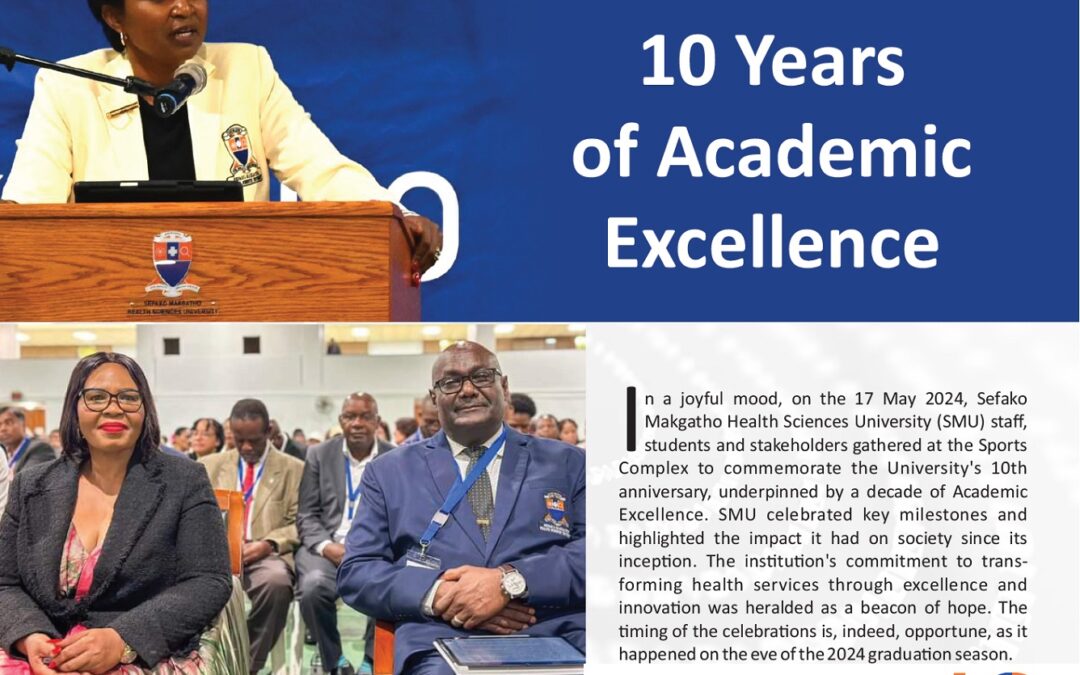
by Lorato | May 22, 2024 | All News, SMU Media, Student Media
In a joyful mood, on the 17 May 2024, Sefako Makgatho Health Sciences University (SMU) staff, students and stakeholders gathered at the Sports Complex to commemorate the University’s 10th anniversary, underpinned by a decade of Academic Excellence. SMU celebrated key milestones and highlighted the impact it had on society since its inception. The institution’s commitment to transforming health services through excellence and innovation was heralded as a beacon of hope. The timing of the celebrations is, indeed, opportune, as it happened on the eve of the 2024 graduation season. Congratulatory messages from dignitaries highlighted the University’s impact on the higher education, health, science and technology landscapes.
The Director General of the Department of Higher Education, Dr Nkosinathi Sishi, speaking on behalf of Minister Prof Blade Nzimande, stated that the establishment of SMU was not only to maintain the institution’s rich history but also to ensure that, “as part of the agenda of the democratic state we increase access for young black learners so that they don’t have to wrestle with the same impediments of the previous generations”. He further encouraged SMU to actively participate in efforts to address health challenges in the country, to increase investment in technology, to uphold the culture of clean governance, to commit to transformation, to address inequalities and a commitment to producing professionals who uphold the highest ethical standards.
Chairperson of the SMU Council Ms Maria Rambauli indicated that she is hopeful that the future is bright for SMU as she believes that the stakeholders will continue to innovate, push boundaries, and lead by example. She said that the institution remains steadfast in its commitment to excellence, ensuring that every student who walks through its doors has the opportunity to fulfil their potential and achieve their dreams. She further implored the university to continue to be a force for good and positive change, advocating for justice, equality, and opportunities for all.
In his address, The Vice Chancellor of SMU Prof Peter Mbati said that in the past ten years, SMU had to honour its heritage, where education and upliftment were paramount, while also creating a new 21st-century entity that stood on the shoulders of the giant, Medunsa. He further indicated that all stakeholders; including the Department of Higher Education and Training (DHET), National Department of Health (NDoH), Gauteng Department of Health and Wellness (GDoH), SMU Council, Executive Management, organised labour, and students, are focused and committed to working together to deliver on the University’s core mandate of teaching, learning, clinical training, research, and innovation, underpinned by service excellence and robust performance culture. He further stated that SMU’s position as South Africa’s only health sciences university opens up incredible possibilities for SMU to further expand its academic and clinical training offerings.
The anniversary celebrations were preceded by the Convocation fundraising and awards gala dinner. Excitedly, the SMU Convocation President Mr Japhta Phala said that he is amazed that SMU is turning 10 years old. He further indicated that when this university was established, he was here as the President of the SRC in 2014, technically making him the first SRC President of SMU. In his address, he shared that “The university hosted its first prestigious convocation fundraising and alumni awards gala dinner.
He further indicated that together with the alumni, “we were able to raise R2.2 million, and a lot of business people and friends of the university pledged their support. This money will assist students who are faced with financial challenges, further indicating that at the beginning of the year, there where our students were not able to register because they had historical debts with the university. This is the initiative to say to the university that as alumni and convocants, this is our help”.
The Gala Dinner honoured distinguished alumni and raised funds for students in need. The evening featured an inspiring Alumni Awards Ceremony, recognizing outstanding alumni across various categories: Young Alumni Awards, Alumni Academic and Innovation Awards, Alumni Impact Awards, Alumni Exemplary Service Awards, Alumni Governance Leadership Awards, and Alumni Lifetime Achievement Awards.
SMU CONVOCATION AND ALUMNI GALA DINNER AWARDS RECIPIENTS:
SMU Alumni Award of Leadership recipients
- Dr Magome Masike (Former NW MEC of Health and current CEO of HPCSA)
- Dr Phophi Ramathuba (Limpopo MEC of Health)
- Dr Stanley Moloabi (Principal Officer of GEMS)
- Dr Dan Mosia (Chief Commercial Officer, Current Chair of UNISA Council)
- Dr Mpho Phalatse (Former Joburg Mayor)
- Dr Bandile Masuku (Former Gauteng Health МЕС)
SMU Alumni Award of Academic Excellence
- Prof Zach Koto
- Prof Mashudu Tshifularo
- Prof Tshepo Gugushe
- Prof Pindile Mntla
SMU Alumni Impact Award Recipients
- Dr Mmereka Patience Ntshani
- Dr Tumishang Makweya
SMU Young Alumnus Award Recipients
- Thabo Sekwati (Bafana Bafana Team Physiotherapist)
- Dr Nthabiseng Maesela (Banyana Team Doctor)
- Dr Carl Tabane (Mamelodi Sundowns Team Physician)
- SMU Exemplary Alumni Award Recipients:
- Dr Thabo Twala
- Dr Tiny Mhinga
- Dr Solly Motlanthe
Newsflash - SMU Celebrates 10 Years of Academic Excellence
File size: 2.58 MB
Created: 22-05-2024
Updated: 22-05-2024
Hits: 44







